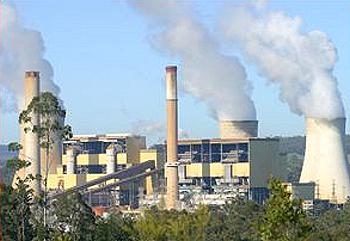
TOWNSVILLE, Queensland, Australia, July 16, 2013 (ENS) – Prime Minister Kevin Rudd today announced that Australia would shift from the country’s current fixed carbon price to an emission trading scheme effective July 1, 2014, a year earlier than planned. But to fill the budget gap of A$3.8 billion left by the change, Rudd has decided to cut environmental programs.
In Queensland as part of his swing around the country ahead of an upcoming election, Rudd said he is aware that many Australians are “feeling cost of living pressures” and also that “most Australians want to see their nation doing its bit, playing its part to protect the environment from the effects of climate change.”

“The Government has decided to terminate the carbon tax, to help cost of living pressures for families and to reduce costs for small business,” said Rudd, a former Labor Prime Minister who regained the government’s top post June 27 by defeating then Prime Minister Julia Gillard for the leadership of the Labor Party.
After the national election of 2010 resulted in a hung Parliament, Gillard won the support of the Australian Greens and three independents to form the government that introduced a price on carbon to curb greenhouse gas emissions.
The carbon price took effect on July 1, 2012. It requires electricity generators and factories emitting over 25,000 tonnes of carbon dioxide equivalent annually to purchase emissions permits. Nine months later, Australia’s emissions of carbon dioxide from electricity generation were down to a 10 year low.
“From 1 July next year Australia will move to an emissions trading scheme, one that is used around the world including in countries like Britain, like Germany and soon in China itself,” said Rudd today.
“We expect the change that we are bringing in will see the price on carbon fall from an expected $25.40 a tonne by next July to around $6 a tonne. This is a big change. Treasury modelling tells us this will reduce pressures on consumers and on businesses.”
“The modelling from Treasury shows that in the financial year 2014-15 an average family will receive a cost of living relief to the value of $380 per year,” said Rudd. “This is modest relief, but it’s real.”
To cover the budget gap of A$3.8 billion, Rudd says several environmental programs will be defunded.

A$3.9 billion worth of savings will achieved by trimming compensation for coal-fired electricity generators and new rules for fringe benefit tax breaks on company cars in addition to cutting the Biodiversity Fund, the Carbon Farming Futures program, the Clean Technology program and the Carbon Capture and Storage program.
The center-left Rudd Government left in place the household assistance already distributed based on the higher carbon price, and Rudd says his government will continue spending on renewable energy.
Australia’s largest environmental group, the Australian Conservation Foundation was critical of the cuts, saying, “Cuts to the Biodiversity Fund and Carbon Farming Futures program undermine the effectiveness of Australia’s effort to cut pollution, while changes to the fringe benefit tax break on company car use and ending the Energy Security Fund two years early will help.”
“Cutting taxpayer assistance to power stations and car use will help reduce pollution, but cuts to the Biodiversity Fund weaken Australia’s efforts to protect our natural environment from the impacts of climate change and is a backward step,” said ACF chief executive Don Henry.
“Our natural environment, including the Great Barrier Reef, our forests and tropical savannahs, are being impacted by climate change now,” said Henry. “It’s important we invest more in protecting, managing and restoring these landscapes so they can naturally store carbon more effectively.”
Rudd’s policy shift met with criticism from the Australian Greens, who form a government with Rudd’s Labor Party.
“You don’t protect the environment by cutting environment programs,” said Greens leader Senator Christine Milne. “Today’s announcement is politically motivated and adds up to a one billion hit to the environment and the transition to clean energy.”

The Australian Greens newest senator, Peter Whish-Wilson of Tasmania, said Rudd’s “back-flip on the carbon pricing mechanism will not only mean the big polluters pay less but will stifle investment in renewables while blowing a hole in the Tasmanian budget.”
“Business and investment decisions were made in response to the carbon price and in step with the necessary transition to renewable energy sources,” said Whish-Wilson. “Now there is only uncertainty – for our emissions reduction effort, for renewable industries, and for Tasmania’s capacity to generate wealth from its renewable resources.”
The price on carbon emissions is expected to be hotly debated in this year’s election, which is set for September 14.
Challenging Liberal Party Leader Tony Abbott to a debate next week on carbon pricing, Rudd cited Treasury modelling to claim that the Coalition’s “direct action” policy would cost householders $1,200 over time.
Federally, the center-right Liberal Party runs in a Coalition with the National Party, the Northern Territory Country Liberal Party, and the Queensland Liberal branch of the Liberal National Party.
Abbott accused Rudd of “deliberately” misleading “Australian families about the cost to them of his new floating carbon tax.”
“Fixed or floating,” said Abbott, “this is still a great big carbon tax that Australian families and businesses will continue to pay.”
Copyright Environment News Service (ENS) 2013. All rights reserved.
